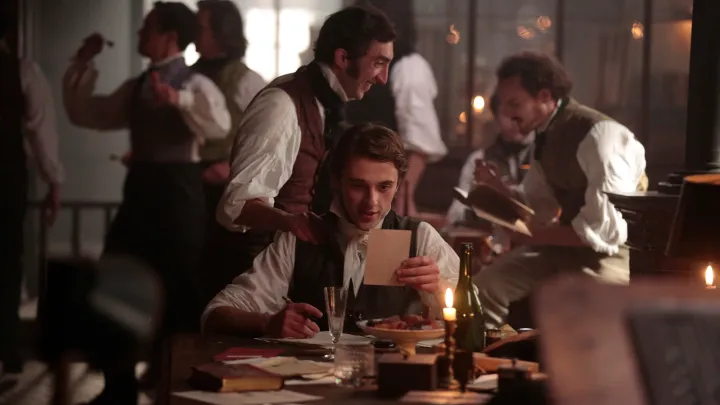In the busy world of Lost Illusions, corruption reigns supreme. Cities are cesspools of crime and debauchery. Fake news circulates like a virus, destroying lives and chipping away at the fragile democratic state. The high cost of living makes everyone scramble for their daily bread, sacrificing whatever ideals they have left just to survive. Nothing is for free, and everything, and everyone, has a price.
No, this isn’t a movie about the state of things in 2022, but rather an adaptation of Honoré de Balzac’s 19th-century novel that is just as relevant today as it was back then. That’s due, of course, to Balzac’s genius, but also to director Xavier Giannoli, who has made one of the year’s best movies by infusing an urgency to what could have been a dreary, stuffy affair. This film moves, and unlike most bloated costume pics, it’s interested in chronicling the gradual rot of the men and women beneath the heavy period makeup and fancy clothing.
A hero’s rise and fall

Lost Illusions begins in the French provincial town of Angoulême, where Lucien Chardon works as a lowly assistant at a printer’s shop. Gifted with the ability to write poetry and charm the ladies, he quickly seduces the married Madame Louise de Bargeton, who is richer and hails from the upper class. Soon, they run away to Paris together in the vain hope of continuing their love affair away from disapproving eyes.
They are spectacularly wrong. Parisian society is more rigid and unforgiving and, as seen in a masterful sequence set at the Paris Opera, a stray handkerchief or a friendly wave could spell doom for anyone wanting to be accepted into high society. With the Madame reluctantly choosing the comforts of her class over love, Lucien is cast off; broke, desperate, and alone.
He soon meets Etienne Lousteau, a cynical journalist who takes a liking to Lucien and shows him the ins and outs of the newspaper industry, which is just beginning to thrive in France under new laws that encourage freedom of the press. These freedoms are exploited by Etienne and his peers, who use the power of the press to get what they want: Money, women, power, and above all, influence. With no title, no money, and a gift to write quickly and maliciously, Lucien soon becomes a leading figure in this toxic world and seeks to win back what he thinks is his rightful place next to Madame de Bargeton in high society.
A vibrant past, with ties to the present

There’s much more in the film: Dirty politicians, pretty prostitutes, two doomed love stories, three nasty rivalries, a handful of shopping montages that would make Sofia Coppola blush, several courses of pineapple dishes (it’s a running gag throughout the picture), and even a pet monkey. But one of the chief pleasures of the film is discovering this lost world that Giannoli has so expertly created. No other movie in recent memory has done as great of a job at recreating a specific time and place in the distant past: Paris in the 1820s. Yet the film isn’t strangled by its sets or costumes; instead, they help shape a detailed portrait of a past society that has more parallels to 2022 than you’d think.
That’s because Giannoli isn’t just interested in doing a respectable adaptation of a routine costume drama. He locates the anger and breathlessness in Balzac’s work, and makes it timeless. In one bravura sequence, Giannoli lays out the rules of Lucien’s new profession, and how taking a simple bribe to publish a good (or bad) review of a book he hasn’t read feeds into a corrupt ecosystem that involves not just the press but also the artists that create them, the distributors that circulate them, the marketers that exploit them, and the politicians that sponsor them. What Giannoli shows, with no heavy hand, is that this ecosystem isn’t specific to Lucien’s world; it’s also how our system is set up as well. Through Lucien’s tragic rise and fall, Giannoli draws parallels to the present, when fake news is used to decimate opponents and everyone seems willing to be bought by the highest bidder.
A sumptuous package

While the direction is the standout element of Lost Illusions, it’s not the only thing that makes the movie great. The acting is uniformly excellent, with everyone having a great time either being virtuous or playing nasty. As Lucien, Benjamin Voisin delivers on the charismatic promise he showed in 2020’s Summer of 85. Naïve yet shrewd, Voisin’s Lucien is an innocent devoured by the wolves he desperately wants to join. As Lucien’s friend-turned-foe Étienne, Vincent Lacoste possesses an oily charm that makes you understand why Lucien falls under his spell. As Lucien’s two great loves, both Cécile de France (as Madame de Bargeton) and Salomé Dewaels (as Coralie) give depth and pathos to their Madonna and Whore archetypes. Best of all is Xavier Dolan’s Nathan, whose mysterious, brooding presence is only fully realized in the film’s devastating climax.
All of these actors embody a world convincingly re-created by the talented production designers, costume designers, and makeup artists, all of whom bring to life the Bourbon Restoration in France from 200 years ago and make it feel vital and lived-in. Christophe Beaucarne’s cinematography frames everything with equal interest and precision, from the beatific provincial countryside of France to the dirty, rat-infested streets of Paris. The end result is a film that eschews the look and feel of the traditional costume picture as a pretty postcard. It’s the story that matters here, and the worldbuilding is there to service Lucien’s tragic tale of ambition and hubris.
Lost Illusions clocks in at a hefty 141 minutes, but not a minute is wasted. Viewers who may be put off the by the length and subject matter can rest easy that the film is as funny, sexy, and entertaining as any movie set in the present day. That it also has a pointed commentary on the roles of media and politics in society, both high and low, is what makes the movie so memorable and, ultimately, affecting. What happened then is still happening now, only with less powdered wigs and monkeys.
Lost Illusions is currently playing in theaters.



